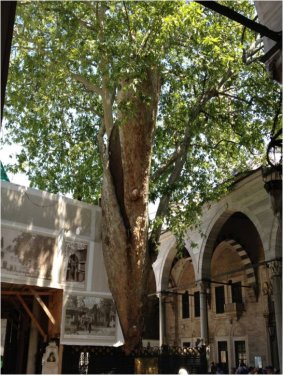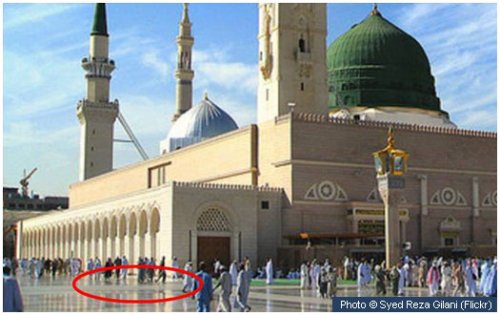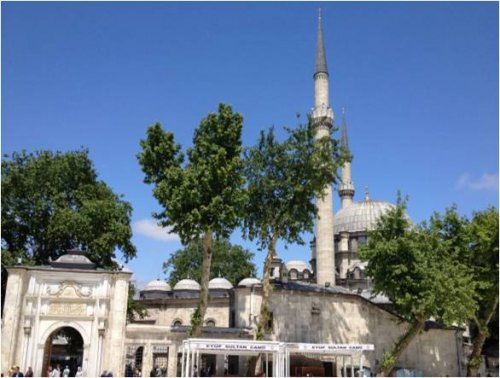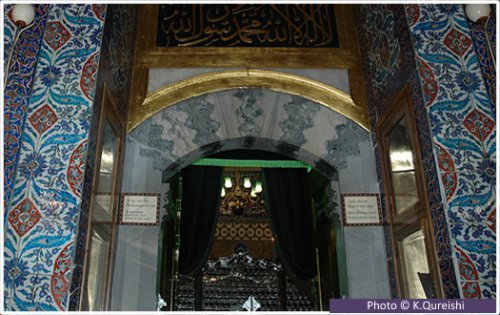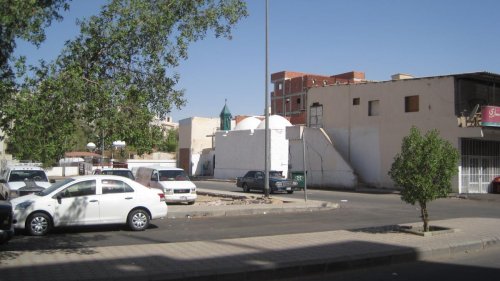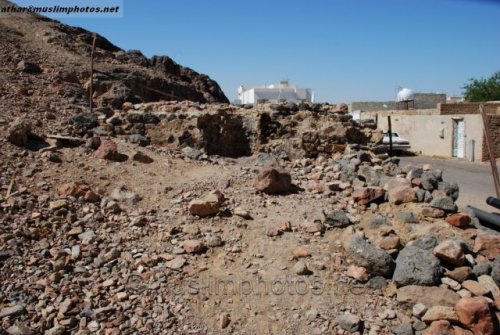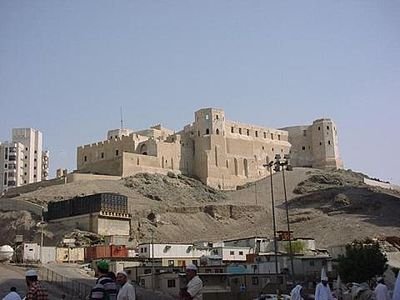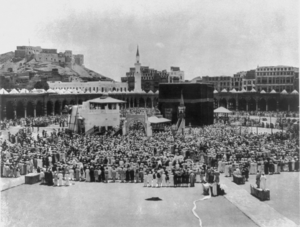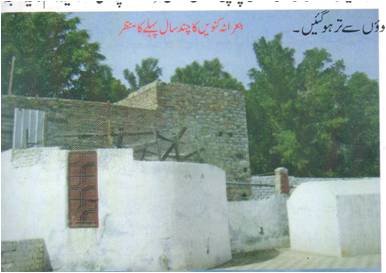-
Posts
8,434 -
Joined
-
Days Won
771
Content Type
Profiles
Forums
Events
Everything posted by ummtaalib
-
Neighbor's Wi-Fi Question: I have question about using neighbours wifi, if by mistake their internet wifi connects on my devices and I use it without knowing its theirs, am I accountable for that, is that stealing and haram? Answer: In the Name of Allah, the Most Gracious, the Most Merciful. As-salāmu ‘alaykum wa-rahmatullāhi wa-barakātuh. It is narrated on the authority of Abū Hurayrah (radiyallahu 'anh) that the Messenger of Allah (sallallahu 'alayhi wa sallam) said: كُلُّ الْمُسْلِمِ عَلَى الْمُسْلِمِ حَرَامٌ مَالُهُ، وَعِرْضُهُ، وَدَمُهُ حَسْبُ امْرِئٍ مِنَ الشَّرِّ أَنْ يَحْقِرَ أَخَاهُ الْمُسْلِمَ Everything of a Muslim is sacred to another Muslim: his property, his honour and his blood. It is enough evil for any man to despise his brother Muslim.[1] It is clear from the hadīth above that as Muslims, we should always take full caution when dealing with others and using anything that belongs to them, especially if it is without their consent. In the enquired case, although you are not liable for accidently using your neighbor's Wi-Fi[2], it is still important to inform your neighbor that you have been unintentionally using his Wi-Fi connection without his permission. If you decide to compensate your neighbor for using his Wi-Fi connection in the past, it will be an expression of your taqwā and Allah consciousness.[3] We also advise you to let your neighbor know that your devices tend to automatically connect to the nearest available Wi-Fi connection and there is a possibility that this will happen again in the future. By notifying your neighbor about this issue, you will be absolved from any accidental future usage of his connection without his permission. And Allah Ta’āla Knows Best Bilal Mohammad Student Darul Iftaa New Jersey, USA Checked and Approved by, Mufti Ebrahim Desai. www.daruliftaa.net [1] Sunan Abī Dawūd, 4882, The Book of Manners [2] الْأَصْلِ أَنَّهُ لَا يَكُونُ ضَامِنًا وَفِي الْفَتَاوَى الصُّغْرَى رَجُلٌ أَتْلَفَ شِرْبَ رَجُلٍ بِأَنْ سَقَى أَرْضَهُ بِشِرْبِ غَيْرِهِ. قَالَ الْإِمَامُ عَلِيٌّ الْبَزْدَوِيُّ: يَضْمَنُ، وَقَالَ الْإِمَامُ خواهر زاده لَا يَضْمَنُ وَعَلَيْهِ الْفَتْوَى فَتَوَهَّمَ بَعْضُهُمْ أَنَّ صَاحِبَ الْهِدَايَةِ تَنَاقَضَ حَيْثُ قَالَ هُنَا لَا يَضْمَنُ إنْ سَقَى مِنْ شِرْبِ غَيْرِهِ وَقَالَ هُنَاكَ وَلِهَذَا يَضْمَنُ بِالْإِتْلَافِ وَلَيْسَ كَذَلِكَ بَلْ مَا ذَكَرَ فِي كِتَابِ الْبُيُوعِ عَلَى رِوَايَةِ مَشَايِخِ بَلْخٍ وَمَا ذَكَرَ هَهُنَا عَلَى رِوَايَةِ الْأَصْلِ (البحر الرائق، ج ٨، ص ٢١٦، ايج ايم سعيد كمبني) أَتْلَفَ شِرْبَ إنْسَانٍ بِأَنْ اسْتَسْقَى أَرْضَهُ بِشِرْبِ غَيْرِهِ قِيلَ يَضْمَنُ وَقِيلَ لَا يَضْمَنُ وَعَلَيْهِ الْفَتْوَى كَذَا في جَوَاهِرِ الْأَخْلَاطِيِّ (الفتاوي الهندية، ج ٥، ص ٢٦٨، مكتبة رشيدية) [قال ابن عابدين] وَأَمَّا ضَمَانُهُ بِالْإِتْلَافِ بِأَنْ يَسْقِيَ أَرْضَهُ بِشِرْبِ غَيْرِهِ فَهُوَ إحْدَى الرِّوَايَتَيْنِ، وَالْفَتْوَى عَلَى عَدَمِهِ كَمَا فِي الذَّخِيرَةِ، وَهُوَ صُحٌّ كَمَا فِي الظَّهِيرِيَّةِ، وَتَمَامُهُ فِي النَّهْرِ (رد المحتار علي الدر المختار، ج ٥، ص ٨٠، ايج ايم سعيد كمبني) [3][قال الحصكفي] (وَلَا يَضْمَنُ مَنْ مَلَأَ أَرْضَهُ مَاءً فَنَزَّتْ أَرْضُ جَارِهِ أَوْ غَرِقَتْ) لِأَنَّهُ مُتَسَبِّبٌ غَيْرُ مُتَعَدٍّ وَهَذَا إذَا سَقَاهَا سَقْيًا مُعْتَادًا تَتَحَمَّلُهُ أَرْضُهُ عَادَةً وَإِلَّا فَيَضْمَنُ وَعَلَيْهِ الْفَتْوَى. وَفِي الذَّخِيرَةِ وَهَذَا إذَا سَقَى فِي نَوْبَتِهِ مِقْدَارَ حَقِّهِ وَأَمَّا إذَا سَقَى فِي غَيْرِ نَوْبَتِهِ أَوْ زَادَ عَلَى حَقِّهِ يَضْمَنُ عَلَى مَا قَالَ إسْمَاعِيلُ الزَّاهِدُ قُهُسْتَانِيٌّ (وَلَا يَضْمَنُ مَنْ سَقَى أَرْضَهُ) أَوْ زَرْعَهُ (مِنْ شِرْبِ غَيْرِهِ بِغَيْرِ إذْنِهِ) فِي رِوَايَةِ الْأَصْلِ وَعَلَيْهِ الْفَتْوَى شَرْحُ وَهْبَانِيَّةٍ وَابْنِ الْكَمَالِ عَنْ الْخُلَاصَةِ لِمَا مَرَّ أَنَّهُ غَيْرُ مُتَقَوِّمٍ وَلَوْ تَصَدَّقَ بِنُزُلِهِ فَحَسَنٌ لِبَقَاءِ الْمَاءِ الْحَرَامِ فِيهِ بِخِلَافِ الْعَلَفِ الْمَغْصُوبِ فَإِنَّ الدَّابَّةَ إذَا سَمُنَتْ بِهِ انْعَدَمَ وَصَارَ شَيْئًا آخَرَ قُهُسْتَانِيٌّ [قال ابن عابدين] (قَوْلُهُ فَحَسَنٌ) يُشِيرُ إلَى أَنَّهُ غَيْرُ وَاجِبٍ وَإِنَّمَا هُوَ لِلتَّنَزُّهِ...وَقَالَ الْفَقِيهُ: لَا آمُرُ بِهِ وَلَوْ تَصَدَّقَ بِنُزُلِهِ لَكَانَ حَسَنًا وَهَذَا أَفْضَلُ (رد المحتار علي الدر المختار، ج ٦، ص ٤٤٧، ايج ايم سعيد كمبني)
-
Sensory Sensitivities Sound This is the most commonly recognised form of sensory impairment. Hearing impairments can affect someone's ability to communicate and possibly also their balance. People with an ASD may experience the following differences. Hypo May only hear sounds in one ear, the other ear having only partial hearing or none at all. May not acknowledge particular sounds. Might enjoy crowded, noisy places or bang doors and objects. Hyper Noise can be magnified and sounds become distorted and muddled. Particularly sensitive to sound and can, for example hear conversations in the distance. Inability to cut out sounds – notably background noise, which often leads to difficulties concentrating. Example...Do you hear noise in your head? It pounds and screeches. Like a train rumbling through your ears. Powell, J. (in Gillingham, G. 1995), page 41 Source
-

Abu Ayyub Ansari (RA) - Madinah to Istanbul
ummtaalib replied to ummtaalib's topic in Prophets, History & Biographies
The Burial Site The Courtyard of Eyüp Sultan Camii. The tomb of Abū Ayyūb al-Anṣārī lies in an alcove just behind the tree. The exact burial site was soon forgotten and only rediscovered after Sultan Muhammad Fatih took Istanbul in 1453. There are many accounts of how the grave was discovered. The following are just two such accounts and Allah ta'ala knows best. When some eight centuries later Fatih Mehmet besieged the city, he and his advisors, as Evliya Çelebi writes, Philip K. Hitti provides a slightly different account than Freely of the burial place’s discovery as well as offering some details concerning Abū Ayyūb’s final campaign: Islamicana -

Abu Ayyub Ansari (RA) - Madinah to Istanbul
ummtaalib replied to ummtaalib's topic in Prophets, History & Biographies
Death He also had a distinguished military career. Much of his time was spent as a warrior until it was said of him, "He did not stay away from any battle the Muslims fought from the time of the Prophet to the time of Muawiyah unless he was engaged at the same time in another." The last campaign he took part in was the one prepared by Muawiyah RA and led by his son Yazid RA against Constantinople. Abu Ayyub RA at that time was a very old man, almost eighty years old. But that did not prevent him from joining the army and crossing the seas as a ghazi in the path of God. After only a short time engaged in the battle, Abu Ayyub RA fell ill and had to withdraw from fighting. Yazid RA came to him and asked: He asked Yazid RA to press on towards the Eastern Roman capital as far as possible and then bury his body there. When it became obvious to the Muslim army that they were unable to conquer the city, Abu Ayyub was buried outside its walls. -

Abu Ayyub Ansari (RA) - Madinah to Istanbul
ummtaalib replied to ummtaalib's topic in Prophets, History & Biographies
He enjoyed a privilege which many of the Ansar in Madinah hoped they would have. When the Prophet (peace and blessings of Allah be on him) entered Madinah he told the people to allow his camel to go her own way for “she is guided by Allah.” All of the Muslims desired that he would lodge with them. Finally the she-camel knelt, but the Prophet (peace and blessings of Allah be on him) did not dismount. The animal rose to its feet again, ambled ahead for some distance, and then turned back and knelt in the same place it had before. Masjid-e-Nabwi was erected on this very spot. Adjacent to the spot where the camel knelt was the house of Abu Ayyub Ansari (may Allah be pleased with him) who hurried to lift the saddle from the camel and took it to his home. The Prophet (peace and blessings of Allah be on him) remarked humorously, “A man must follow his saddle,” and went along with Abu Ayyub. Asad bin Zurara (may Allah be pleased with him) took hold of the halter, so he was allowed to take care of the camel. According to other reports, lots were cast and was drawn in the favour of Abu Ayyub Ansari (may Allah be pleased with him). The house of Abu Ayyub Ansari was double-storied. When it was settled that the Prophet (peace and blessings of Allah be on him) would stay at this place, he offered the Prophet (peace and blessings of Allah be on him) to stay on the upper storey but the Prophet could not agree to this proposal, as he felt that people frequently coming to meet him would disturb his (Abu Ayyub’s) family. Thus the ground floor was made vacant for the Prophet (peace and blessings of Allah be on him). Abu Ayyub (may Allah be pleased with him) sent meals to him twice a day and whatever he left uneaten was shared by Abu Ayyub and his wife. He would look at the marks of the Prophet’s (peace and blessings of Allah be on him) fingers on the food and place his own fingers at the same spots as a source of blessing.Although the Holy Prophet (peace and blessings of Allah be on him) had stayed at the ground floor according to his own wish, it was quite unbearable for Abu Ayyub (may Allah be pleased with him) and his wife that they should live upstairs while the Prophet (peace and blessings of Allah be on him) was downstairs. They were much disturbed to think that in this way they were showing disrespect to the Prophet (peace and blessings of Allah be on him). One night they could not sleep and passed the whole night sitting in a corner of the roof. In the morning Abu Ayyub (may Allah be pleased with him) came to the Prophet (peace and blessings of Allah be on him) and said, “O Prophet of Allah, we could not sleep at night but passed the whole night sitting in a corner of the roof.” When the Prophet asked the cause, he replied, “Our parents may be sacrificed on you, we always remain thinking that we are committing disrespect to you. Last night this feeling grew to the utmost and we could not sleep.” After this he requested, “O Prophet of Allah, have mercy upon us and kindly shift upstairs. We are your slave and shall remain satisfied under your feet.” The Prophet (peace and blessings of Allah be on him) granted his request and moved upstairs while Abu Ayyub and his wife moved to the ground floor. References: The History of Islam – Akbar Shah Najeebabadi, When the Moon Split – Safiur Rahman Mubarakpuri, Siratun Nabi – Allama Shibli Nomani & Syed Suleman Nadvi IslamicLandmarks -
Brother akmadkhan, assalaamu 'alaykum Welcome to the forum however i must inform you that your post has been edited with the links removed. Any form of advertisement is strictly not allowed on the forum. Please read Forum Rules your co-operation will be appreciated. Jazaakallaahu khayraa.
-
Abu Ayyub Ansari (Radhiyallahu 'anhu) His full name was Khalid ibn Zayd ibn Kulayb and he was from the Banu Najjar. He was a great and close companion of the Prophet sallallaahu 'alayhi wasallam. He was known as Abu Ayyub (the father of Ayyub). This is the approximate spot where existed the house of Abu Ayyub Ansari (may Allah be pleased with him). IslamicLandmarks This is where the Prophet (peace and blessings of Allah be on him) initially stayed for several months on his migration to Madinah, while Masjid-e-Nabwi and the adjoining rooms for his wives were being built. Buried in Istanbul His grave lies in Istanbul where he was honoured with martyrdom during the siege of Constantinople in the caliphate of Muawiyah (may Allah be pleased with him) in 48 AH. IslamicLandmarks Just beyond the city walls and alongside the Golden Horn is the district of Eyüp, named after the tomb and mosque complex built around the burial site of Abū Ayyūb al-Anṣārī (d. 52/672). Eyüp Sultan Camii Islamicana (Click on picture to enlarge) Tomb of Abu Ayyub Ansari RA *Note that this entry has been shown for information purposes only. On no account should anybody pray towards a grave or seek supplication through them as this is tantamount to committing shirk, associating partners with Allah (Glorified and Exalted is He). IslamicLandmarks
-
Masjid Al Shaykhayn (Or Al- Badai') Where night was spent on the way to the Battle of Uhud Also known as Masjid al-Dir' (Masjid of the Armour). This is where the Prophet sallallaahu 'alayhi wasallam spent the night on his way to the Battle of Uhud. There he prayed Fajr Salaah and reviewed his army. There also 'Abdullah ibn Ubayy, the chief hypocrite, decided to turn back with his three hundred, thus depriving Muslims of one third of their number. (From "Memories of the Luminous City")
-
Ruins of Masjid al Fash at Uhud مسجد الفسح This is where, after the Battle of Uhud, the Prophet sallallaahu 'alayhi wasallam and his Companions RA prayed. (From "Memories of the Luminous City")
-
Question I have heard two points in a lecture regarding procedures related to after the Nikah. 1) It is Sunnah sprinkle water on each spouse. 2) It is Sunnah for the father of the bride to go to the house of the couple and make Du’a for them. It was mentioned that Nabi (Sallallahu ‘alayhi wa sallam) went to the home of Sayyidatuna Fatimah (radiyallahu ‘anha) after the Nikah and made a certain du’a for them. I humbly request if you could please explain the steps outlined above as well as include the relevant du’as and references. Answer It is authentically reported by Sayyiduna Anas ibn Malik (radiyallahu ‘anhu) that: “……. Nabi (sallallahu ‘alayhi wa sallam) went to the home of Sayyiduna ‘Ali (radiyallahu ‘anhu) -after performing the nikah- and asked for water. Sayyidatuna Fathimah (radiyallahu ‘anha) brought the water and Nabi (sallallahu ‘alayhi wa sallam) took a sip and then gargled it out into the bowl. Consequently he sprinkled the water on her head and chest and recited: ’Allahumma inni u’idhuha bika wa dhurriyataha minash shaytanir rajim’ Translation: O Allah! I seek your protection for her and her progeny from Shaytan the accursed. Rasulullah (sallallahu ‘alayhi wa sallam) asked her to turn around and sprinkled water on her back and repeated the du’a. Nabi (sallallahu ‘alayhi wa sallam) then asked for more water and repeated the same action on Sayyiduna ‘Ali (radiyallahu ‘anhu) and recited the same du’a, by altering the suffix to the masculine tense ie. Allahumma inni u’idhuhu bika wa dhurriyatahu minash shaytanir rajim. Translation: O Allah! I seek your protection for him and his progeny from Shaytan the accursed. Nabi (sallallahu ‘alayhi wa sallam) then said to Sayyiduna ‘Ali (radiyallahu ‘anhu) “you may now proceed with your wife in the name of Allah and with the blessings of Allah” (Sahih ibn Hibban; At Taqasim Wal Anwa’, hadith: 3283, Al Hisnul Hasin, pg. 91) In other versions of the above, Rasulullah (sallallahu’alayhi wasallam) also recited the following du’a for each of them: Allahumma barik fi hima wa barik lahuma fi bina ihima Translation: O Allah Bless them and bless their union (Majma’uz Zawaid, vol.9 pg.209. Also see Hayatus Sahabah, vol.2 pg.896-898) And Allah Ta’ala Knows best Verified by: Moulana Muhammad Abasoomer hadithanswers
- 1 reply
-
- 1
-

-
Receiving the Reward of Sadaqah based on Intention عن معن بن يزيد رضي الله عنهما قال كان أبي يزيد أخرج دنانير يتصدق بها فوضعها عند رجل في المسجد فجئت فأخذتها فأتيته بها فقال والله ما إياك أردت فخاصمته إلى رسول الله صلى الله عليه و سلم فقال لك ما نويت يا يزيد ولك ما أخذت يا معن رواه البخاري (الترغيب و الترهيب 1/68 Hadhrat Ma’n bin Yazeed (Radiyallahu Anhu) reports: On one occasion my father Yazeed took out some Dinaars to give in charity. He proceeded to the Musjid and placed the Dinaars by a person in the Musjid. I went to the person and the person gave the dinaars to me. I then came to my father with the dinaars. (When my father learnt of what had transpired, he was displeased and took an oath) saying: “I did not intend giving the money to you.” I then took the matter to Rasulullah (Sallallahu Alaihi Wasallam). Upon hearing the entire story, Rasulullah (Sallallahu Alaihi Wasallam) said: “O Yazeed, you will receive the full reward for your sadaqah based on your intention,and O Ma’n, the dinaars are now yours (as it came to you through a halaal means).” Ihyaaud Deen
-
Three Electoral Commitments Every Muslim Should Make By Shaykh Mawlānā Muhammad Saleem Dhorat hafizahullāh Islamic Da'wah Academy Like the rest of the country, the UK’s Muslim community is gearing up to vote on May 22nd. The political parties have been campaigning in earnest for some time, outlining their policies and stressing their commitments to the nation. During the days preceding polling day, Britain’s Muslims should be asking themselves what commitments they have made when it comes to casting their votes. Here follows a summary of a speech delivered by Shaykh Mawlānā Muhammad Saleem Dhorat hafizahullāh, containing valuable advice for the Muslim voter. The Secret of Success Allāh ta‘ālā has placed the desire for progress, and the spirit of mutual competitiveness that accompanies it, into the very nature of man. It is natural for individuals and communities to strive to better themselves and achieve progress. As Muslims, we should open the pages of history and discover and adopt those factors which make a nation prosperous, as long as they fall within the bounds of the Sharī‘ah, so that we too can reap the Dīnī and worldly benefits of progress. Our study should commence with trying to ascertain the secret behind the success of the noble Sahābah radhiyallāhu ‘anhum, for they are ideal role models of a community that attracted success in its every endeavour. A thoughtful investigation will reveal three prominent qualities which can be attributed to their success. In this election season every Muslim, no matter what his/her preferred party, should commit him/herself to observing these three principles in order to secure success and achievement, both on a personal and a communal level. The First Commitment - Taqwā The Sahābah radhiyallāhu ‘anhum hated all disobedience to Allāh ta‘ālā, they neither had a habit of sinning nor were they fond of any sins. Abstention from sins is the essence of taqwaa, and through it Allāh ta‘ālā has promised relief from every difficulty. In dealing with the election issue, we must not say or do anything that displeases Allāh ta‘ālā. Of all the sins to beware of, backbiting and slander are major sins which are a particular threat at such times. One inclined towards a particular party should not backbite or slander a supporter of another party, for in doing so the requirements of taqwā will be compromised; and Divine assistance and blessings can not be expected in the absence of taqwā. The Second Commitment - Ikhlās Every decision taken by the Sahābah radhiyallāhu ‘anhum was for the Pleasure of Allāh ta‘ālā, keeping in mind the life hereafter and the good of the community. They would be ready to sacrifice everything for the sake of Allāh ta‘ālā. Whether standing for election, supporting a party or voting, a Muslim must be pure in his intentions. This intention should be to elect the candidate who will best serve the Muslim community in common and humanity in general. If a Muslim has sincerity then his vote will go to the right candidate, for he will consider that he is voting to please Allāh ta‘ālā and therefore he will expend his energies in finding out who the best candidate is. The Third Commitment - Unity Unity is a key factor for the success of any nation; a truly united community can withstand any competition. Individuals should have the courtesy of mutual respect despite their political rivalries. Sadly, the Muslim community is a divided one. Every individual has the right to his own opinion and his own preference, within Shar‘ī boundaries, but our mutual differences transform into malice and enmity towards each other. Not even our masājid are free from our feuding. We can only hang our heads in shame when matters reach ahead and TV and press reports announce that political wrangling amongst Muslims has spilled over into fights outside a masjid after Friday prayers. We go to the extremes; if we like something in a particular person, we praise him to the extreme, whereas if we disagree with someone on one issue, we become blind to all the good qualities he possesses. Our dealings are but a faint shadow of the Islamic concept of brotherhood our beloved Prophet sallallāhu ‘alayhi wasallam taught. True brotherhood demands that whatever our political stripe, we should be able to sit at a table and sacrifice our political allegiances for the sake of Allāh ta‘ālā and agree to support the candidate who is best for the Muslims in common and the country in general. We should be willing to marginalize our differences in order to progress in a common direction. In fact, if the Muslims of a particular constituency were to unite on a single platform and form a committee, responsible for recommending the best candidate to Muslim voters, every party would turn to the committee and seriously consider its demands on behalf of the Muslim community. They would realise the importance of securing the Muslim vote. All that is needed to achieve unity is a little sacrifice and the willingness to swallow one’s pride. May Allāh ta‘ālā grant us all the longing to strive for taqwā, ikhlās and unity. Āmīn. Using Your Vote The vote is very important. It is a means of electing the person most beneficial for the community and our country. Voting is a big responsibility. Not voting or voting incorrectly will bring power to the wrong person. The best candidate deserves our vote. We should become politically aware. We should read every party’s manifesto. We should study party policies via the internet, radio, newspapers and knowledgeable people in our communities, who possess political acumen. We should find out which party offers us the best in all spheres of life; education, housing, health, social issues, international policy etc. Deciding on a party by just looking at one issue does not constitute farsightedness. We should think rationally, not make judgements based on emotions. Finally, we should make du‘aa to Allāh ta‘ālā, asking Him to enable us to make the right choice and that may He grant success to those who will serve the country and its citizens without any prejudice or wrong.
-
May Allah ta'aal grant correct understanding of Deen without which it is not in reality, Islam!
-
The Heart is for none but Allah Once Hazrat Asraf Ali Thanvi ® was going to his house from his Khanqah. I [Mufti Muhammad Shafi ®] was going along with him as I had some works with him. Suddenly Hazrat Thanvi ® stopped and took out a pen and paper. He jotted something down on the piece of paper and out it back in his pocket. Then he asked me: “Did you understand anything (what I did)?” I answered, “No”. He explained, “I’ve jotted down on the paper the words which were in my heart. I remembered that I have a task to be accomplished after returning to the hanqah. If I had not written it down, it would have repeatedly disturbed my heart. After writing it down on the paper my heart is free from it”. Then he said, “The heart has been created for Allah Taala”. Therefore, the heart must be mainly engaged in remembrance of Allah Taala. For necessity one may bear other things in the heart; however, this should be limited. To fill the heart with secular love and thoughts is a great mischief. The difference between the Ambiya (Alaiyhimussalam), Awliaya ® and us is that both were engaged in worldly affairs; however, the previous were the perfect example of: “Hand is at work, but the heart completely absorbed in the remembrance of Allah Taala”. Source
-
The Man Who Committed 99 Murders There’s a story related in Sahih Bukhari emphasising the vastness and generousness of Allah’s mercy. The Prophet (saws) picked on certain events throughout history to show their importance. This emphasised a certain message that he was trying to convey to us. Since the events of the past are so numerous, the ones chosen to be related and preserved in his words till the end of time must be of great importance. Whenever we hear stories of the past we should always remember that Allah had chosen those stories to be related as a great occurrence. There was a man who had heartlessly murdered 99 people, when all of a sudden he felt remorse over what he had done. He asked the people in his town if they knew anyone who was pious enough to get advice from. They recommended to him an ascetic who lived in the mountains. So the man went to this learned person and told him about the past and his wishing to repent for his actions. He asked the man, “Will Allah forgive me?”. The learned man was so shocked by everything he had heard that he said “No, you will not be pardoned.” So the murderer killed him as well! He felt remorse yet again and asked the people if they knew anyone else. They recommended to him another scholar who they were acquainted with. Again, the murderer asked the same question, “Will Allah forgive me?” Being a truly wise man and knowing Allah’s all-encompassing mercy and His ability to forgive anything, the scholar replied “Of course you will be pardoned, repent at once!” The wise man also gave him some advice, telling him of a city where there were devoted worshippers of Allah. He recommended that he move there to be around them and not to come back to his town, which was the place of evil. So the man started towards that town and on the way he died. The angels of mercy descended upon him and so did the angels of punishment. They started arguing over him. The angels of mercy said “This man had repented and was seeking Allah, so he is ours.” The angels of punishment said “This man had never done anything good in his life and did not even complete his repentance.” Allah sent another angel to them in the form of a man, and both parties took him as their arbitrator. This angel said “Measure the distance of the earth between the two cities, and let him be assigned to the one he is closest to.” When the angels measured the distance, it just so happened that he was nearer the town of his destination just by a hand-span, and so the angels of mercy took away his soul to paradise. Another version narrates that Allah had ordered the earth to be stretched such that he became closer to the city of piety and further from the city of evil. Lessons: Allah’s mercy is all-encompassing and He can forgive any sin, even the most heinous such as murdering 100 people, at least 1 of whom was a pious person After repenting from a sin, we should always immediately take steps to avoid returning to it again We should not fall into despair when we sin, because if we repent and turn back to Allah, He will help us be among those who are forgiven
-
Ajyad Fortress on the Bulbul Hill The Ajyad Fortress was built during the Ottoman era on the Bulbul Mountain overlooking the Haram in Makkah. It was demolished in 2002 for commercial development of the Abraj Al-Bait Towers. The Ajyad Fortress in the background - 1889
-
A young innocent girl sacrifices her all to become her husband's when she says "Yes" to her Nikah. How much sacrifice do we make for the One, when we say "Laa-ilaaha illallaah"? Shaykh Ashraf Ali Thanwi ra
-
Story of Suraaqa ibn Maalik RA At the time of the Hijra (the migration from Makka to Medina), the Prophet (saws) and Abu Bakr were being chased across the desert. The Quraysh were pursuing them and had a bounty of 100 camels placed on the Prophet’s head. Motivated by the large reward, one of the best trackers in Makka, Suraqa Ibn Malik, went riding on his horse looking for the Prophet (pbuh) every which way until he found him. Dressed in his armor and sword, Suraqa attempted to kill the Prophet but as soon as he would approach him, his horse would sink into the sand and not budge. He tried several times.... Read story.... Bracelets of Kisra.pdf Well of Ja'raa' - Place where Suraaqa ibn Maalik RA accepted Islam
-
Advices Hazrat Maulana Yunus Patel (Rahmatullahi 'alayh) There are so many of us who very foolishly and ignorantly pride ourselves over our wealth, family name, beauty – sometimes even our knowledge of Deen or the services we are rendering of Deen; considering these as the criteria for establishing our superiority over others. Whenever the nafs asserts itself with : ‘I am better… than him (or her)’, we should understand that we are on the same footing as shaytaan. When Allah Ta’ala commanded the angels to bow down to Hazrat Aadam (AS), shaytaan refused to do so. When asked as to why, he asserted : ‘I am better than he. You created me from fire, and him from clay.’ [surah A’raaf 7 :12] This opinion of : ‘I am better…’ is reason enough for serious concern, since this attitude is what is termed as pride (takabbur), arrogance and conceit (ujub), the cancer of the spiritual heart. This is such an ailment which also leads to the evil of boasting. Allah Ta’ala states : “Verily Allah does not like the one who has pride and is boastful.” [surah An-Nisaa 4 : 36] “And swell not your cheek (for pride) at men, nor walk in insolence through the earth; for Allah loves not any arrogant boaster.” [surah Luqman 31 : 18] Allah Ta’ala makes evident His abhorrence by humiliating and abasing such a person and reducing the person’s esteem in the eyes of people. It has been related from Rasulullah (Sallallaahu ‘alayhi wasallam): “…he who is proud will be abased by Allah, for though he considers himself great, he is lowly in the eyes of men to such an extent that he is of less value in their estimation than a dog or a pig.”[5] Source Ibn Hazm Al’Andulasi, Rahmatullahialay “If you take pride in your physical strength, remember that the mule, the donkey, and the bull are stronger than you and better suited to carrying heavy loads. If you feel vain about the lightness of your running style, remember that the dog and the hare surpass you in this field. It is extremely curious that rational beings feel proud of something in which they are surpassed by dumb animals.”
-
Stories Haughtiness brought down by a Flea There was an oppressive king who stubbornly said, "I will most certainly find out who is inhabiting the heavens and whose kingdom is running there." When Allah ta'ala saw his open rebellion, He caused the weakest of His creations to overpower him. A flea went into his brain through his nose and deprived him of his sleep. He instructed his subjects to strike him hard on his head. They began striking him and continued to the extent that his brain got damaged. In this way a small insect became the cause of his death. (Hilyatul Auliya) Note: Haughty people like him continue to be born in every era. They actually challenge Allah ta'ala. But He breaks their pride and arrogance and disgraces them in this very world. (Aqwaal-e-Salaf - Mawlana Muhammad Qamaruzzamaan) The Scholar and the Ferryman A scholar of language and grammar undertook a journey. A river had to be crossed. As was custom in those days, the scholar hired the boat of a waiting ferryman who took people across the river. During the journey, the scholar asked the ferryman, with obvious pride and mockery, if he knew anything about grammar and the rules of language. The ferryman simply replied “I don’t.” “Alas!” Retorted the scholar of grammar, “You have wasted half of your life!” At this, the sailor was terribly hurt and aggrieved. But he kept quiet. Suddenly, the boat was extremely nervous in the high waves and gushing water. “Do you know how to swim, learned sir?” Asked the sailor. “No” said the scholar.” The ferryman remarked “Alas! You have wasted your whole life for the boat is sure to capsize in a few minutes!” Haqislam Pride of the Flying Tortoise Long ago there were two Geese who regularly visited a pond to eat Fish. The Geese always had a chat with the lonely Tortoise living in the pond. They spent many days talking about different things and their acquaintance grew into friendship. One day, when the Geese realized there were no more Fish in the pond, they decided to migrate to a new and larger pond up north. They conveyed their decision to their friend, the lonely Tortoise. The Tortoise felt sad and expressed his wish to go along with the Geese. The Geese thought this is a very good idea. "Why don't we take lonely Tortoise along with us? Then we all can live together forever!" The Tortoise was delighted, but soon realized the problem. "How can I go with you? Because I cannot fly." The Tortoise was very disappointed that he would not be able to go with the Geese. The Geese came up with a solution, "Don't worry. We have thought of a way to solve this problem. We will hold a stick between us. Hold onto the middle of the stick with your mouth. This way, we all can fly to our new location." But, warned one Goose, "Our plan is good, but you have to be very careful. At no time during our journey you should open your mouth, for, if you do, you will fall from the sky and be smashed to death on the ground." The Tortoise thought for a while and agreed to be sure to keep his mouth champed round the stick all throughout the journey," he said. Once they were all set, the Geese and the Tortoise set off on their journey northwards. As they flew, they had to pass through many villages, where people came running out to see this strange sight. "Look at the Tortoise. See how the Geese carry him between them." Shouted the children. The Tortoise wanted to tell them that he was going with his friends to a new pond and that there was nothing strange in it, but he remembered his friends warning and kept his mouth shut. Village after village, people ran after the strange flight. "A flying Tortoise!" some shouted. The Tortoise soon began to swell with pride. He thought to himself, "I am so great. All the villagers are running out to see me. If these Geese had not come with me, no one would have ever noticed them." Every village that they passed, the Tortoise was greeted with cheering and shouting. Finally the Tortoise could contain himself no more. He opened his mouth to speak, "I am ..." As soon as he opened his mouth, his hold on the stick was lost and he came hurtling through the air and fell on a rock with a loud crack. The poor Tortoise died on the spot. The Geese flew sadly away. "If only he had not been so proud," they thought, "he would have been living happily with us."
-
The Cure for Kibr (Pride) Imam Uthman dan Fodio Translated by A`isha `Abd ar-Rahman at-Tarjumana As far as its cure is concerned, there are two parts: the knowledge-cure and the action-cure. The remedy can only be effected by joining the two of them. 1- The knowledge-cure The knowledge-cure is to know and recognise yourself and to know and recognise your Lord. That will be enough to remove your pride. Whoever knows and recognises his own self as it should be known and recognised, knows that it is not worthy of greatness, and that true greatness and pride are only for Allah. As for gnosis of his Lord and His glory, it is too lengthy a subject for us to discuss here [...]. Self-recognition is also a lengthy subject. However, we will mention what will help you towards humility and submisiveness. It is enough for you to recognise one ayat of the Book of Allah. The knowledge of the first and the last is in the Qur'an for whoever has his inner eye open. Allah ta`ala said: "Perish man! How thankless he is! Of what did He create him? Of a sperm-drop. He created him, and determined him, and then made him the way easy for him. Then He makes him die, buries him, and then, when He wills, raises him." This ayat points to the beginning of man's creation, his end, and his middle. Let a man look at that if he desires to understand its meaning. As for the beginning of man, he was "a thing unremembered". He was concealed in non-existence. Non-existence has no beginning. What is lower and meaner than obliteration and non-existence? He was in non-existence. Then Allah created him from the basest of things, and then from the most unclean thing. He created him from earth and then from a sperm-drop, thena blood-clot, then a lump of flesh. Then He made the flesh bones, and then clothes the bones in flesh. This was the beginning of his existence and then he became a thing remembered. He was a thing unremembered by reason of having he lowest of qualities and attributes since at his beginning, he was not created perfect. he was created inanimate, dead. He neither heard, saw, felt, moved, spoke, touched, perceived, or knew. He began by his death before his life, by weakness before his strength, by ignorance before knowledge, by blindness before sight, by deafness before hearing, by dumbness before speech, by misguidance before guidance, by poverty before wealth, and by incapacity before capacity. This is the meaning of His word, "From what did He create him? And determined him," and the meaning of His word, "Has there come upon a man a period of time when he was a thing unremembered? We created him of a sperm-drop, a mingling, trying him. We made him hearing, seeing. We guided him upon the way, whether he is thankful or unthankful." He created him like that at the beginning. Then He was gracious to him and said, "We made the way easy for him." This indicates what He wills for him during the period from life to death. Similarly, He said, "of a sperm-drop, a mingling, trying him. We made him hearing, seeing. We guided him on the way." The meaning here is that He gave him life after he was inanimate and dead - first from the earth, and then from a sperm-drop. He gave him hearing after he was deaf and He gave him sight after he lacked sight. He gave him strenght after weakness and knowledge after ignorance. He created his limbs for him with all they contain of marvels and signs after he lacked them. He enriched them after poverty, made him full after hunger, clothed him after nakedness, and guided him after misguidance. Look how He directed him and formed him. Look at how He made the way easy for him. Look at man's overstepping and at how thankless he is. Look at man's ignorance and how he shows it. Allah ta`ala said, "Part of His sign is that He created you from earth." He created man from humble earth and unclean sperm after pure non-existence so that he would recognise the baseness of his essence and thereby recognise himself. He perfected the sperm-drop for him so that he would recognise his Lord by it and know His immensity and majesty by it, and that He is the only one worthy of true greatness and pride. For that reason, He described him and said, "Have We not given him two eyes and a tongue and two lips, and guided him on the two roads?" He first acquainted him with his baseness and said, "Was he not a sperm-drop extracted? Then he was a blood-clot. Then He mentioned His favour and said, "He created and fashioned and made a pair from it, male and female," in order to perpetuate his existence by reproduction as his existence was acquired in the beginning by original formation. When you begin in this manner and your states are like this, how can you have arrogance, pride, glory, and conceit? Properly speaking, man is the lowest of the low and the weakest of the weak. Indeed, even if He had perfected him, delegated his command to him and made his existence go on by his own choice, he would still dare to be insolent and would forget his beginning and his end. However, during your existence, He has given illnesses power over you, whether you like it or not, and whether you are content or enraged. You become hungry and thirsty without being able to do anything about it. You do not possess any power to bring either harm or benefit. You want to know something but you remain ignorant of it. You want to remember something and yet you forget it. You want to not forget something and yet you do forget it. You want to direct your heart to waht concerns it and yet you are caught up in the valleys of whispersings and thoughts. You own neither your heart nor your self. You desire something while your destruction may be in it, and you detest something while your life may be in it. You find some foods delicious when they destroy and kill you, and you find remedies repugnant when they help you and save you. You are not safe for a moment, day or night. Your sight, knowledge, and power may be stripped away, your limbs may become semi-paralysed, your intellect may be stolen away, your ruh may be snatched away, and all that you love in this world may be taken from you. You are hard-pressed, abased. If you are left alone, you go on. If you are snatched away, you are annihilated. A mere slave. A chattel. You have no power over yourself or anyone else. What can be more abased? If you recognise yourself, how can you think yourself worthy of pride? If it were not for your ignorance - and this is your immediate state - you would reflect on it. Your end is death. It is indicated by His word, "Then He makes him die and buries him. Then, when He wills, He raises him." The meaning here is that your ruh, hearing, sight, knowledge, power, senses, perception, and movement are all stripped away. You revert to the inanimate as you were in the first place. Only the shape of your limbs remains. Your form has neither senses nor movement. Then you are placed in the earth and your limbs decay. You become absent after you existed. You become as if you were not, as you were at first for a long period of time. Then a man wishes that he could remain like that. How excellent it would be if he were left as dust! However, after a long time, He brings him back to life to subject him to a severe trial. He comes out of his grave after his spearated parts are joined together, and he steps out to the terrors of the Rising. He is told, "Come quickly to the Reckoning and prepare for the Outcome!" His heart stops in fear and panic when he is faced with the terror of these words even before his pages are spread out and he sees his shameful actions in them. This is the end of his affair. It is the meaning of His word, "Then when He wishes, He raises him." How can anyone whose state this is be arrogant? A moment of freedom from grief is better than arrogance. He has shown the beginning and the middle of his condition. If his end had appeared to him - and we seek refuge from Allah - perhaps he would have chosen to be a dog or a pig in order to become dust with the animals rather than a hearing, speaking man, and meet with punishment (if he deserves the Fire). When he is in the presence of Allah then even the pig is nobler than him since it reverts to dust and it is spared from the Reckoning and the punishment. Someone with this state at the Rising can only hope for pardon, and he cannot be at all certain about it. How then can he be arrogant? How can he see himself as anything to which excellence is attached? This is the knowledge-cure. 2- The action-cure : As far as the action-cure is concerned, it is to humble yourself to people in a constrained unnatural manner until it becomes natural for you. tazkiyatips
-
Anti-Kibr Therapy Hakim al Umma Maulana Ashraf Ali Thanvi (Allah have mercy on him) prescribed the following to a seeker, ‘The therapy for the reality of arrogance is a special form of contemplation (muraqaba). It must be renewed and repeated at all the times when the thought of arrogance passes (in the mind). This muraqaba includes, 1. Although I have this achievement, it is not my own creation. It has been bestowed by Allah. 2. This bestowal is without my being deserving of it. It is Allah’s mercy and benevolence. 3. After bestowal preserving it is beyond my control. Allah has the power to take it away anytime. 4. Although the other individual does not possess this achievement as yet. It is possible that eventually he will achieve more than me and I will be looking up to him for assistance in this regards. 5. Even if eventually he does not achieve this, as it sometimes evident by the apparent (lack of) means. It is possible that right now he has some other achievement that is hidden from me but evident to others or hidden from all. It is known to Allah alone. By the virtue of this his overall achievements are better than mine. If none of his achievement come to mind than bring to mind the possibility that as per the knowledge of Allah he is accepted (maqbool) and I am not. And if I am accepted to than he is more accepted than me. Hence, how can I think of him to be inferior to me? 6. Think that even in case he is lower than me in all regards than he has a right on me. As the deficient individual has on the perfect one. Like the sick person has on a well individual, a weak on the strong, and a poor on the wealthy. Hence, I should be kind and have empathy for him. Moreover, I should try to assist him in achieving them successfully. If I do not have any means or power or time even than by making supplication (dua) for his success. Then start effort in regards to successful accomplishment of his achievements. This will create a bond of kindness with this individual. And it is a natural phenomenon that working for an individual’s development and success leads to loving him. After (feeling of) love there is no thought of considering him inferior. 7. If this (#6) can not be done than occasionally talk to him gently and politely. Inquire about his well being. This will create a mutual bond. And after this bond thought of considering him inferior will dissipate.’ Tarbiyet us Salik, volume 3, page 108-9 Source
-
THE DISEASE OF PRIDE The disease of pride and arrogance deletes all traces of goodness and piety. This is the worst vice in causing havoc to Deen and a regrettable disease to have for the followers of this perfect and exalted religion. It launches a direct attack on beliefs and principles. If ignored and overlooked for sometime it becomes fatal and incurable, and gives rise to other spiritual maladies and vices, which are no less than four in number, as, mentioned below: 1. Being deprived of truth and truthfulness. The heart becomes blind to the verse dealing with knowledge about Allah. It is a very grievous vice in which the mind of a man becomes dull and impervious to the understanding of Deen. Allah has said in the Holy Quran: “I shall turn away from My revelations those who show pride in the world wrongfully.” (7.146) Allah has said in another place in the Quran: “And in this way Allah does put a seal on every arrogant disdainful heart.” (40.35) 2. The wrath and punishment of Allah fall on the jealous person. Allah has said: “Certainly He does not love the proud ones.” (16:23) It is narrated that Hazrat Moosa asked exalted Allah: “Oh my Lord! Who is the most deserving of your wrath and displeasure?” Allah Ta’aala told him: “ It is he whose heart is filled with pride and his tongue is filthy (i.e. Abusive), his eyes are devoid of shame, his hands are miserly and he is of bad conduct and character. 3. Allah will put the proud to disgrace and ill-repute (dishonour) in the Hereafter. Hazrat Hatim Asam (rahmatullahi alaihi) has said: “Do not die in a state of pride, greed and arrogance.” Allah does not cause the proud fellow to meet his death unless he is disgraced and dishonoured by his own family, relatives and servants. Similarly the greedy does not meet his death unless he becomes destitute for a morsel of food and a drop of water. In the same way the arrogant person does not meet his own death unless being polluted with his own excrement and urine. 4. The proud renders himself liable to Hell in the Hereafter. It occurs in a Hadith Qudsi: “Pride is My cloak and grandeur is my trousers. If anyone disputes with Me in any one of these (two) I shall admit him into the Hell-fire.” In the other words, pride and grandeur are two exclusive attributes of Allah, which none is allowed to apply and ascribe towards himself. It is imperative to refrain from such a dangerous and deadly calamity which leads to loss of knowledge of Allah, inability to understand the commands of Allah, His displeasure, disgrace in this world and the Hereafter and painful torment therein. No wise person can be neglectful in the matter of such a harmful and destructive calamity. We should, therefore, try to save ourselves from this and seek refuge from Allah. This is a brief account of the four calamities, mentioned in the beginning. Each of these four adversities are very harmful and dangerous in the sight of those wise and knowledgeable persons who are aware of the importance of the reforming of ones heart. Those are the four disease and vices that stem from having pride. How many of us are there that can honestly say, without deceiving ourselves that we are free of this hated ailment? Not many, is the answer. It is imperative that we take heed from this article and we bear in mind the punishment promised by Allah Ta’ala to those with pride in their hearts. Pride as a sin is incorrectly considered to be insignificant and minute in comparison to other major sins, by a vast majority of the people. It may be that compared to the major sins like murder and associating partner with Allah, it is slightly inferior. But that is only because of the magnitude of those particular sins that pride is considered a lesser sin. In a Hadith of the Holy Prophet it is narrated that, “Whosoever has in his heart, even a atom of pride he will not enter paradise.” In observing the above Hadith, it is of utmost importance that we get rid of this spiritual malady, if we hold any illusion or hope of entering paradise. Remember that we do claim to be the followers and believes of Islam and we claim to be Muslims, so how then can we still have pride in ourselves? For the very meaning of Islam is to submit totally and conditionally to the worship of the Supreme Being, Allah Ta’ala and as Muslims it is incumbent upon us to get rid of every drop of pride, superiority and haughtiness within us, as we are small and inferior in comparison to the Supreme Being, if such comparison can be made. So let's try and act upon the very essence of our religion and our adjective as Muslims and submit and surrender ourselves to the worship and pleasure of Allah Ta’ala. inter-islam
-
Hazrat Shibli’s (Rahmatullahi Alaihi) manner of compassion to an ant Shaikh Sa’di (Rahmatullahi Alaihi) mentions: Hazrat Shibli (Rahmatullahi Alaihi) purchased some grain from the city. Thereafter he tied it in a cloth, placed it on his head and carried it to his village. When he reached home he opened the bundle. He saw that in the grain there was an ant running about in distress. Hazrat became extremely worried that perhaps the distress of the ant is due to being separated from a close associate. Perhaps its heart is uneasy due to the separation. Hazrat spent the entire night without a wink of sleep. The next morning he tied the cloth into a bundle again and travelled to the place where he had purchased the grain. When he reached the shop, he opened the bundle and released the ant. Can we ever imagine a person with such a heart of love and compassion causing pain and hurt to any human being? (Jawaahir Paare)

